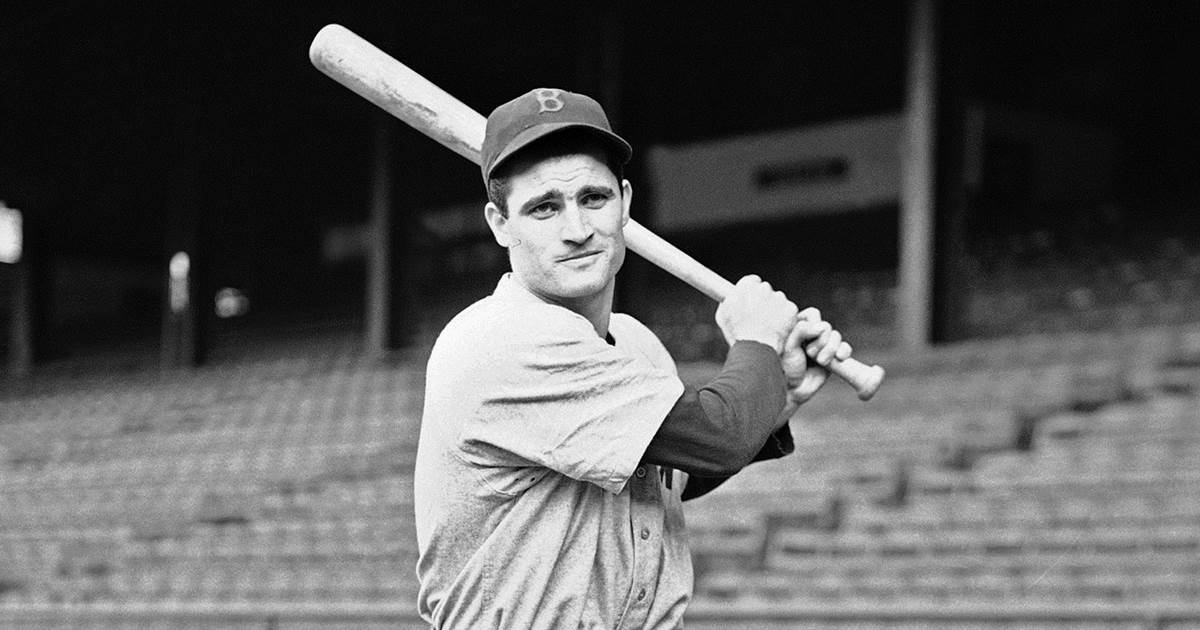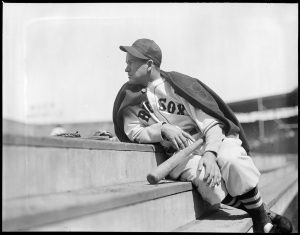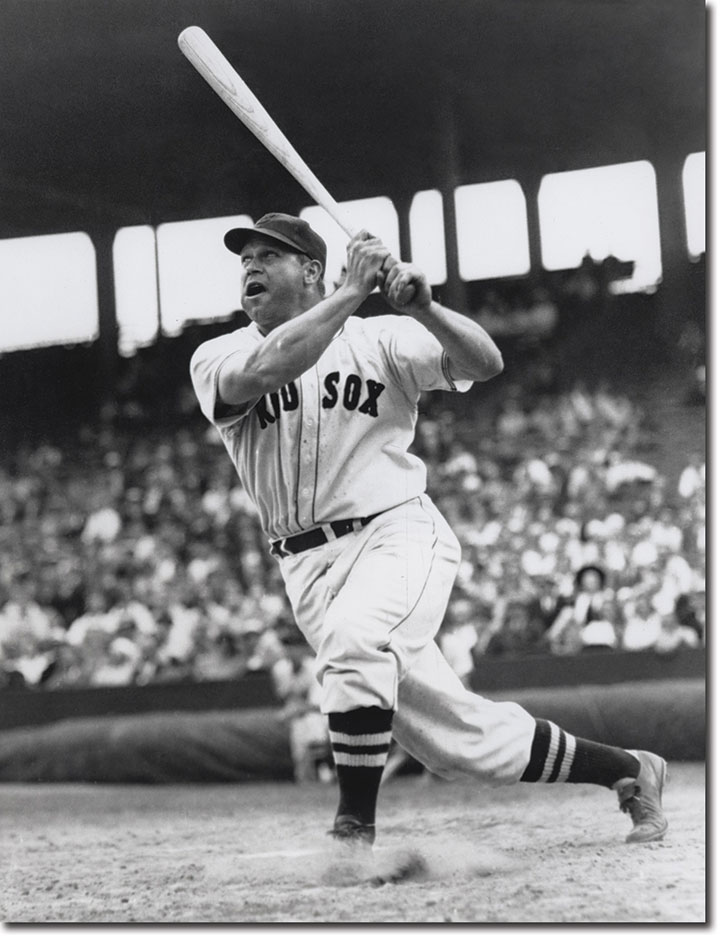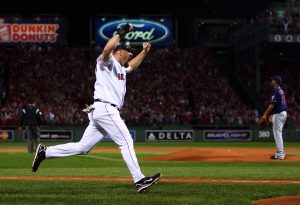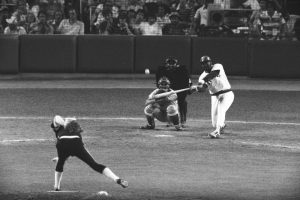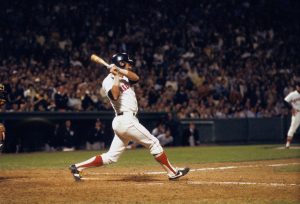One of my projects for the MLB offseason this year will be a series of articles covering the greatest Red Sox to wear each uniform number. My plan is to cover five uniform numbers at a time starting here with one through five. Right off the bat, we dig into a couple retired numbers. Before I begin, I would like to mention that Brandon Phillips became the first player in franchise history to wear the number zero this September. He didn’t play much, but he did pimp out this game-winning home run against the Braves.
Number 1 – Bobby Doerr
The greatest second baseman in franchise history, Bobby Doerr made the Baseball Hall of Fame in 1986 and has his number one retired by the Red Sox. Doerr played on some great teams in the forties with pals Ted Williams, Johnny Pesky and Dom DiMaggio. He had a smooth glove at second base and was one of the finest offensive players at the keystone position the game had seen.
Doerr batted .318 in 1939, his third season in the big leagues. By the next season, he had surpassed 20 home runs and 100 runs batted in for the first time. He would make four straight All-Star Games from 1941-44 before joining the fight overseas in World War II and missing the 1945 season. After returning, Doerr made three straight All-Star Games and five times in six seasons to close out his career. He drove in more than 100 runs in four of the five seasons following World War II, finishing with 95 the season he fell short.
Unfortunately, Doerr was forced into early retirement due to a bad back. He had actually become more consistent at the plate later in his career, posting an OPS between .886 and .891 each year between 1948 and 1950. He still finished with a very solid .826 OPS in his final season. From his first full season in 1938 through his last in 1951, Bobby Doerr averaged a season of .289 with 17 home runs and 95 RBI.
Honorable Mentions: George Kell, Bernie Carbo, Billy Conigliaro, Joe Foy
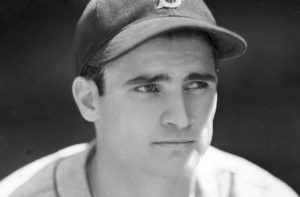
BOBBY DOERR from the Boston Red Sox. (Photo by Sporting News via Getty Images)
Number 2 – Jacoby Ellsbury
Ellsbury’s career has spiraled, but that’s a good thing since he’s eating up the Yankees payroll to do nothing. With the Red Sox, he was a good player when healthy and helped the Red Sox win two World Series. Ellsbury came up that year and was so successful down the stretch that he was put on the postseason roster. He then batted .438 in the World Series. Ellsbury was solid again in the 2013 postseason, winning a second World Series with the Red Sox.
Ellsbury spent parts of seven seasons with the Red Sox, but only had four relatively full seasons. He led the league in stolen bases in three of his four healthy seasons. He batted .300 twice and stole 50 bases three times. In 2011, Ellsbury had a career season, finishing second in the MVP vote, winning a Gold Glove and the Silver Slugger. While the rest of the team collapsed down the stretch, Ellsbury was white hot and would have won the MVP if the team hadn’t fallen apart and missed the playoffs.
Honorable Mentions: Rick Ferrell, Xander Bogaerts, Jerry Remy, Mike Andrews
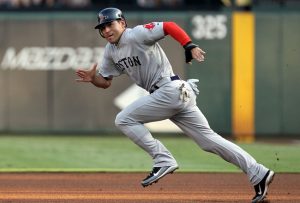
Number 3 – Jimmie Foxx
Foxx is one of the most powerful right-handed bats of all-time. The greatest first baseman in Red Sox history, Foxx won one of his three MVP Awards with the Red Sox and finished second in another season. He homered 35 or more times in each of his first five seasons with the team, averaging 40 home runs and 134 runs batted in per season. There is a reason Foxx was referred to as “The Beast.”
In 1938, his third season in Boston, Foxx won the MVP Award. That season he hit 50 home runs and drove in a league high 175 runs. His slash line that season was .349/.462/.704/1.166, leading the league in each category. The next season he batted .360 and led the league in on-base percentage, slugging percentage and home runs. Cumulatively, Foxx batted .320 with the Red Sox and is second in franchise history in on-base percentage and slugging percentage behind only Ted Williams.
Honorable Mentions: Pete Runnels, Jody Reed, Jeff Frye, Walt Dropo
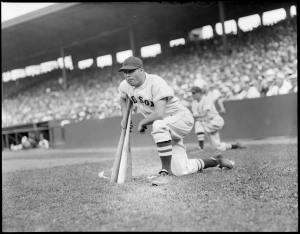
Number 4 – Joe Cronin
Another retired number, as the Sox retired the number four in honor of Cronin. Cronin spent seven seasons as a full-time player before he started focusing more on managing the club and being limited to mostly pinch-hitting. Despite this role, Cronin batted over .300 with an OPS over .900 each of his first two seasons doing so.
Cronin made five all-star teams with the Red Sox and had two top ten MVP finishes. From 1937-41 he batted over .300 four times, posting a .307/.404/.504/.909 line during that time period. He averaged 19 home runs and 103 runs batted in during that time. He was the Red Sox manager from 1935-47. After, Cronin went on to become general manager, president and treasurer of the team before moving on to the role of American League president.
As a close second, Jackie Jensen deserves a few words. Jensen hit 20+ home runs in each of his first six seasons with the Red Sox, averaging a season of .285 with 26 home runs and 111 RBI. He was the 1958 MVP and won a Gold Glove the following season.
Honorable Mentions: Jackie Jensen, Butch Hobson, Tommy Harper, Carney Lansford
Number 5 – Nomar Garciaparra
During his time in Boston, Nomar was one of the most popular players the franchise had ever seen. Around Fenway Park, around the city, you could hear people yell “Nomaaahhh!” Arguably the greatest shortstop in franchise history, the uniform number five is synonymous with Nomar for an entire generation of fans.
Nomar came up with much fanfare and won the Rookie of the Year in 1997. He hit 30 home runs and led the league in hits that season. In year two, Nomar finished runner-up for the MVP Award. The following two seasons he was batting champion, hitting .357 and .372. Nomar was getting better and better, before an Al Reyes pitch hit him on the wrist, requiring surgery the following season. Nomar was still an excellent player when he came back, but wasn’t quite the same. His averages fell to .310 and .301 his next two full seasons. However, he did hit 52 home runs and drove in 225 runs over those two seasons. He also led the league with an astounding 56 doubles in 2002.
Things didn’t end on the best terms in Boston for Nomar, but he should be remembered for what he did with the team and for how much the fans loved him. He batted .323 with a .923 OPS during his time in Boston. Nomar hit 50 doubles twice and eclipsed 40 two other seasons. In his six full seasons with the Sox, Nomar hit over 20 home runs in all six. He is truly a Red Sox legend.
Honorable Mentions: George Scott, Vern Stephens, Jim Tabor
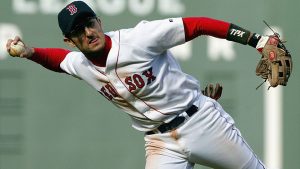
Featured picture from NBC News
